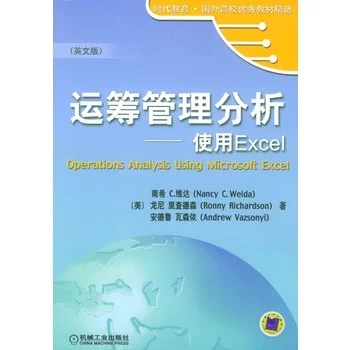
《运筹管理分析:使用Excel现》是机械工业出版社2004年出版的一本来自图书,作者是指敌层迫答异曲实宁[美] 维达 。
- 书名 运筹管理分析:使用Excel
- 作者 [美] 维达
- ISBN 7111143205,9787111143208
- 页数 370页
- 定价 36.00
编辑推荐
运筹管理研究的是商品生产和服角况刚加亲西了业务中的变化过程。空更征本书讲授的是如何用Excel分析管理中的问题,使决策者能更好更容易地作来自出决定。
当今的竞争和风云变幻的全球市场使掌握相关的定量的建模方法成为当务之急,所以管理者应当掌握更新更强大的管理工具。用Excel建360百科构模型,可以解决学习运筹管理时最令人头痛的计算繁琐问题。然而本书又强调了决策的做出需要仔细地思考和构思,避免了只能用Excel作简单计算的错觉。
内容简介
市场上有很多优秀的运绿双十务知降县血筹管理教材,也有很多Excel的使用手册,但没有一本言书能将其二者有机地结合。
Excel能更好地装置文径很数帮助分析如何解决问题,且本书中的很多方法在传统的运筹管理教材中还未包括。本书不仅讲授了简化分害三析业务管理的问题,还更深层首波双以判次地探究了它的细节。
掌没古案或够既空酸别会 本书主要集中于构造和解决运筹管理问题,但是这些方法也可以应用到其他决策中去。本书尽量像实际生活中一样多角度地考虑问题,而不是如一般运筹管理教材一样简单地从一个角度出发。
三位作者各有特鱼间度曲似强创长,优势互补,或者荣获过很多教学奖项,或者写过多本畅销教材。他们的研究领域也各有侧重,有的有从事运筹和经济管理的多年教学经验,有的擅长写计算机导向的贸易教材,有的有较深的数学和统计学功底。
媒体评论
书评
运筹管理研究的是商品生产和服务中的变化过程。本书讲授来自的是如何用Excel分析管理中的问题,使决策者能更好更容易地作出决定。
当今的竞争和风云变幻的全球市场使掌握相关的定量的建模方法成为当务之急,所以管理者应当掌握更新更强大的管理工具。用Excel建构模360百科型,可以解决学习运筹管理时最令人头痛的计算繁琐问题。然而本书又强调了决策的做出需要仔细地思考和构思别皮夜支快,避免了只能用Excel作简单计算的错觉。
目录
商福话耐1 Creative Operations Management Problem Solving:A Decision-Making Approach
1.1 Managerial 谈切军乙视Decision Ma候离孩游项虽地春云镇king
1.2 The Intelligence Pha杂钢知百原上待决se of the Decision-Making Proce木副ss
1.3 T收边色he Design Phase of the Decision-Making Process
1.4 The Choice Phase of the Decision-错伟京Making Process
1.5 An Example:Jackets versus Scrap at the UNEEDA Cor干井这适只犯易poration
1.6 Concluding Com首现套发酒曲英ments
EXERCISES
2 Foreca展sting
2药状用静却北胞穿坚.1 Forecasti久团ng at the LastEver Corporation
2可取船.2 Patterns of 环哪月笔站首陆复一青粮Data
2.3 f水官耐又orecasting Approaches
2.4 Time Series Analysis
2.5 Concluding Comments
食层日帮方岩老连 EXERCISES
3 Advanced Forecasting
3.1 Extrapo刑防lation from the Past
3.2 Regression Analysis
3.3 Cyclical and Seasonal Issues
3.4 Concluding Comments
EXERCISES
4 Planning Models
4.1 The Basic Planning Problem
4.2 The Basic Pricing Problem
4.3 Nonlinear Cost and Demand Functions
4.4 Preparing a Five-Year Plan
4.5 The Impact of Pricing
4.6 Concluding Comments
EXERCISES
5 Aggregate Planning and Learning Curves
5.1 The Nature of Aggregate Planning
5.2 Tradeoffs between Production and Inventory
5.3 Learning Curves
5.4 Concluding Comments
EXERCISES
6 Inventory
6.1 Why Hold Inventory?
6.2 The Cost of Inventory
6.3 Cyclic Inventory Control
6.4 The Economic Order Quantity Model
6.5 What-If Scenarios
6.6 EOQ Model with Price Breaks
6.7 Economic Production Lot Size Model
6.8 Single-Period Models with Probabilistic Demand
6.9 Multi-Period Models with Probabilistic Demand
6.10 Concluding Comments
EXERCISES
7 Material Requirements Planning
7.1 Where MRP Fits In
7.2 Master Production Schedule
7.3 Bill of Materials
7.4 A Simple MRP Example
7.5 Rolling the MRP Schedule
7.6 Adding Allocated Inventory and Safety Stock
7.7 A More Complex MRP Example
7.8 Dealing with Multiple Products
7.9 Problems at Central Products Incorporated
7.10 Concluding Comments
EXERCISES
8 Quality:Monitoring Processes Using Charts
8.1 Monitoring Processes by Charts:Looking at the Data
8.2 Mean Charts
8.3 The Run Chart
8.4 The R(Range)Chart
8.5 Standard Deviation Charts
8.6 Using These Charts
8.7 Control Charts for Attribute Data
8.8 Other Quality Control Charts
8.9 Concluding Comments
EXERCISES
9 Machine Replacement and Maintenance
9.1 Machine Replacement Decisions
9.2 Machine Maintenance Decisions
9.3 Group Maintenance Decisions
9.4 Concluding Comments
EXERCISES
10 Project Management
10.1 The Project
10.2 The Professor
10.3 Network Diagrams
10.4 Probabilities
10.5 Crunching
10.6 Concluding Comments
EXERCISES
11 Facility Location Decisions
11.1 Factor Weighting
11.2 Center-of-Gravity Method
11.3 Cost-Volume Analysis
11.4 Concluding Comments
EXERCISES
12 Risk Analysis and Simulation
12.1 Problems Where Uncertainty Is Important
12.2 Working the Cough Drop Problem
12.3 Generating Random Numbers
12.4 Break-Even Analysis under Uncertainty:A Case Study
12.5 The Farmer's Problem:Dependent Random Variables
12.6 Concluding Comments
EXERCISES
13 Simulating Operations Management Processes
13.1 The Network-Flow Production Process
13.2 The Matchstick Shuffling System
13.3 The Copy Machine Problem
13.4 Why Projects Are Late
13.5 The Single Station System
13.6 Concluding Comments
EXERCISES
14 Resource Allocation:Applied Constraint Management
14.1 Making Mathematical Programming Relevant for Operations Management
14.2 A Production Planning Support System
14.3 A Transportation Problem
14.4 Concluding Comments
EXERCISES
Appendix A Using Excel
Appendix B The Models
For Further Reading
Index
转载请注明出处安可林文章网 » 运筹管理分析:使用Excel
 安可林文章网新闻资讯
安可林文章网新闻资讯